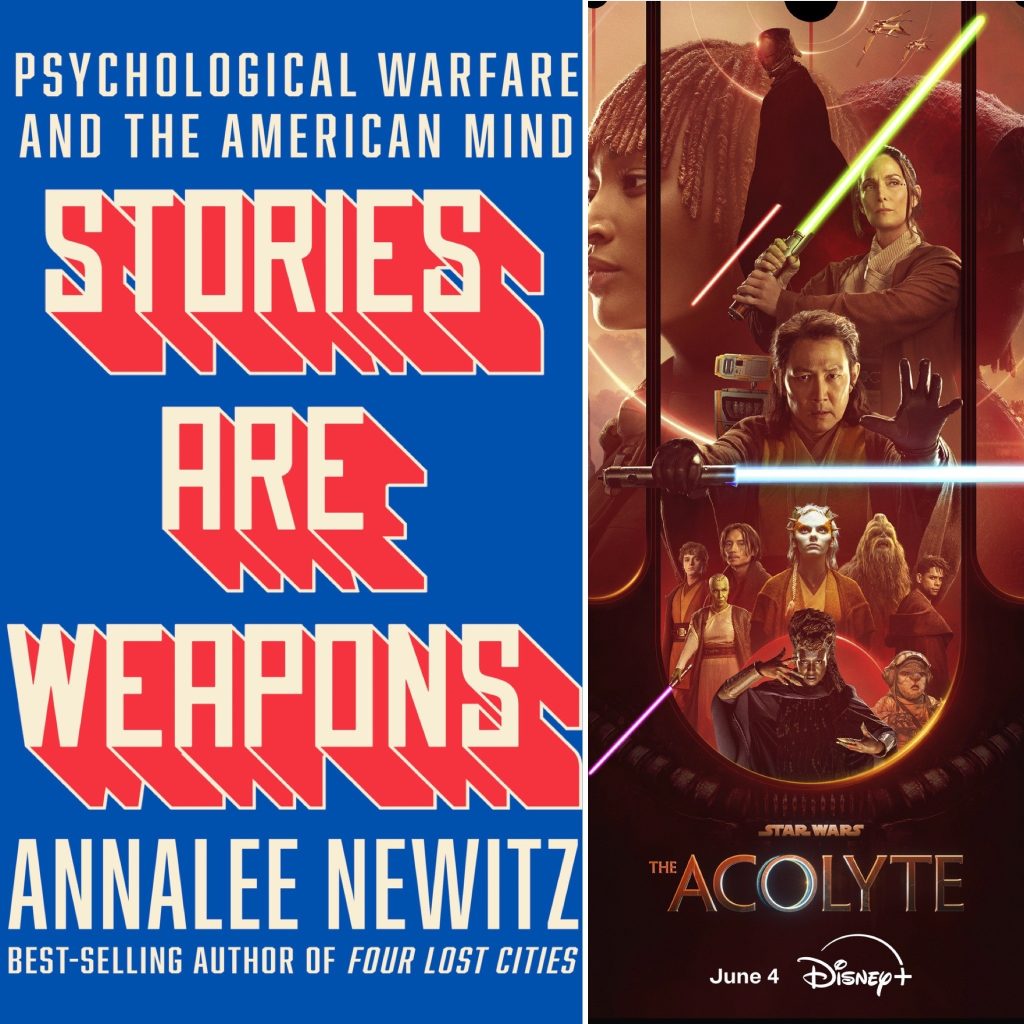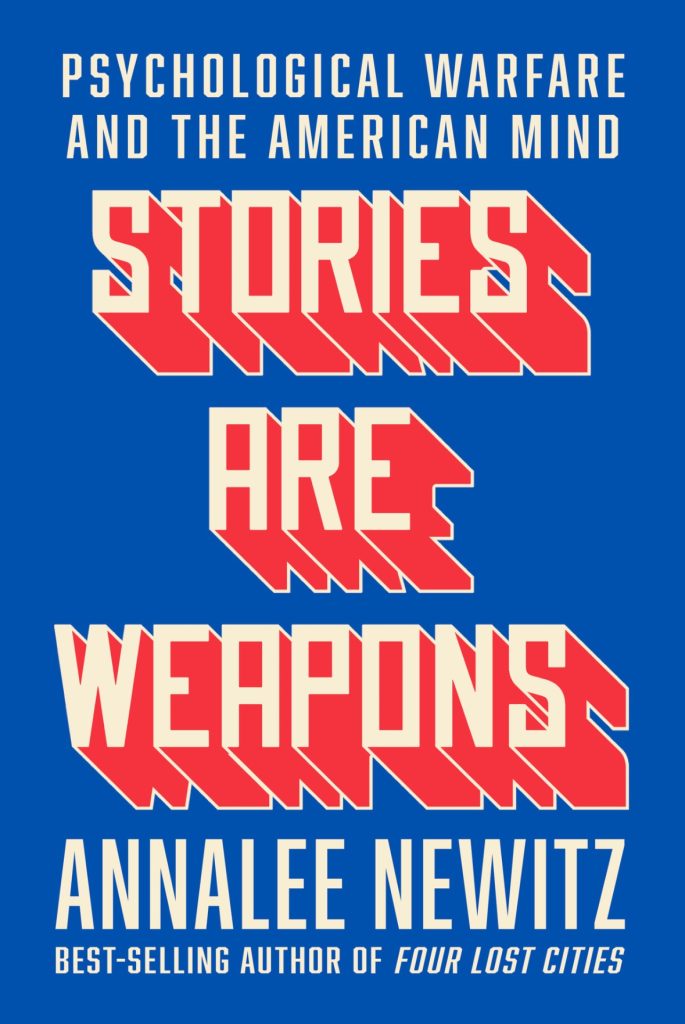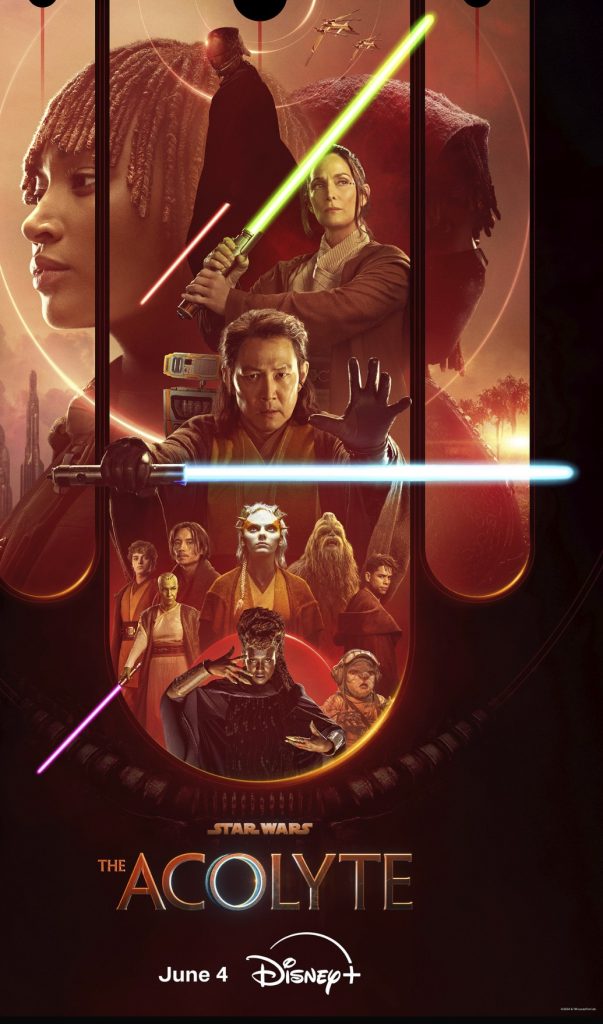
This is a post created by serendipity of encountering two new pieces of media at the same time. I finished reading Annalee Newitz’s Stories Are Weapons and watched the latest episode of Disney+ Star Wars series The Acolyte last night. This post is simply about reacting to the content of both and how they crossover in my mind at this moment.
Stories Are Weapons

I read Annalee Newitz’s latest book very quickly. Partially because of their excellent previous book Four Lost Cities, partially because I read How to win an Information War by Peter Pomerantsev lately on this same topic of propaganda.
The importance of fiction with an underlying truth comes up in both books. The use of narrative in literature and theatre to set and reset attitudes and behaviours.
Both books use history to discuss the present. How Allied propaganda was designed and deployed in World War 2 (very specifially in the Pomeranstsev book focussed on Sefton Delmer) and in the Cold War and later (more broadly in the Newitz book focussed on Paul Linebarger).
The Newitz book is slightly more forward looking in discussing what happens next in an Information War. The discussion of post-conflict actions and conflict prevention is very interesting.
On the latter point, there is a discussion of using fiction, science fiction, to imagine and lay out positive or alternative futures. This kind of futurology or design fiction is popular nowadays. I have used it myself a few times: The Mona Lisa on my mantelpiece is a microstory about a post-economic society.
In the conclusion of Annalee’ Newitz’s book:-
Stories are weapons. They are also,…, gifts of peace.
Stories are weapons, Annalee Newitz, 2024
This is a positive sense of using narrative and storytelling to both prevent and predict better futures.
But what if we stayed in propaganda-mode and predicted the inevitability of awful futures?
The Acolyte

Watching episode 4 of The Acolyte earlier in the evening. I was depressed by how oppressive the Republic and the Jedi appeared. The rise of the Sith and the Empire offer a relief rather than a fear.
The long-term project of Star Wars producers to backfill all the topics and characters of the original movies continues and it is everything as dreadful about the idea of Canon as the last SpiderMan animated movie warned about.
[note: I love the first Star Wars movie but I am ambivalent about everything since then. As with Dr. Who, I watch more in a sense of geeky duty than deep interest. I prefer Star Trek]
In backfilling the larger politics of the Star Wars universe something unhelpful happens.
As noted above, SciFi is usable to offer the possibility of positive change. However, it is quite often used to create the shivering horror of negative change. The Hunger Games series and the later narrative backfilling of that particular world’s history is one example.
There is SciFi offering a broad range, a diversity, of fictional futures that people can experience and judge. This aligns well with the idea of Autonoetic Conciousness. The theory that humans are endlessly telling themselves (or seeking out) stories about possible futures and experiencing how they feel. Imagine, predict and act as a way of human being.
What I felt at this moment, in this time, is how The Acolyte is an unhelpful story in a time of deep political tension about the rise of authoritarianism and the failure of democracy.
Does adding more detail, more emotion and more depth to the failure of the Republic help as a story for all of us now?
By showing more clearly how the rise of the Sith and the Empire is both, to some extent, necessary and inevitable, Star Wars is propaganda for people who want to collapse democracy now and impose authoritarian solutions.
SciFi as a form of imaginative and predictive futurology twists weirdly when it goes backwards through its own self-imposed canon of world-building and history.
Canon acts like history and people treat it like history. This creates problems as history is used politically to justify what is done in the present and the future. One political difference is between Small History and Big History.
There is the Small History that conservatives prefer: showing a clear line from past to present to future. Small History has dates and men and battles: it is the history taught in schools many years ago. In Big History, the versions created by actual historians thru ongoing research (well represented in Stories are weapons in the description of Coquille tribal history and SWORP archive) are diverse and divergent. Nothing is truly inevitable in history once you know more history.
Canon as a fictional history is Small History. Authors only detail in what is needed to progress the plot. This is why conspiracy theorists attach to some SciFi plots as they have a clear and clean narrative path. Do listen to this BBC Radio documentary Conspiracies: The Secret Knowledge and the interview with a TV writer who realises that his fictional global-spanning conspiracy is attractive because of it mixture of inevitability and supercompetence. Confusing canon and history means that the Small History idea within a fiction can be used to minimise the possibilities of actual future life.
Star Wars, in both the prequels and the modern sequels, repeatedly shows the fragility of positive futures and the inevitability and resilience of negative futures.
Showing and telling stories of terrible futures to scare ourselves and to warn against actions in the present that may have bad consequences in the future is natural. However, telling these stories at a time of weak narratives about positive futures and strong stories about the inevitability of negative futures appears dangerous. Star Wars is a massive and powerful narrative weapon and the Acolyte does not appear good at this time and moment. It weakens people at a time when strength is needed.
Stories are weapons and it is wise to know how they are being wielded in our shared societies. How we tell stories backwards and forwards has effects upon how we think about our futures together. In telling stories forwards, for positive futures, we need to take care that we have Big History running backwards. Diversity and Divergence as foundations for hope. The Acolyte shows the dangers within fictions of tightly inevitable bad futures constrained by tightly locked canonic fictional versions of Small History going backwards.